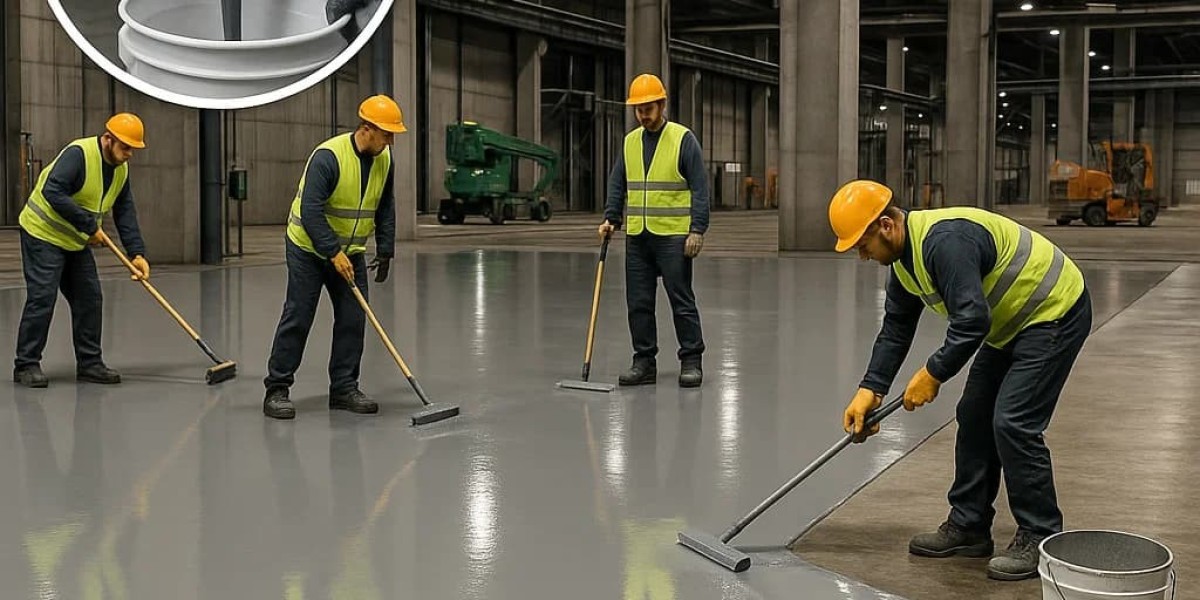The construction industry has evolved remarkably over the past few decades, driven by innovations in materials science and advanced chemical formulations. Among these, epoxy resin has become a cornerstone of modern construction practices. Known for its exceptional strength, bonding ability, and durability, epoxy resin plays a crucial role in reinforcing structures, protecting surfaces, and enhancing longevity. From industrial flooring to waterproof coatings and concrete repair systems, epoxy materials offer unmatched versatility and performance. Their application not only boosts structural integrity but also contributes to aesthetic finishes and sustainable development. As builders and engineers increasingly seek materials that balance performance with environmental responsibility, epoxy resin stands out as a trusted solution for high-quality, long-lasting construction outcomes.
Understanding Epoxy Resin in Construction
Epoxy resin is a thermosetting polymer formed through the chemical reaction of epoxides with curing agents such as amines or anhydrides. Once cured, it creates a hard, durable, and chemically resistant material. This unique composition gives epoxy resin its distinct properties—excellent adhesion, resistance to moisture and chemicals, and the ability to bond with a variety of substrates, including concrete, metal, and stone.
In construction, epoxy resins are used for a wide range of applications such as flooring systems, coatings, crack repairs, and adhesive formulations. Their ability to form seamless, impermeable layers makes them ideal for environments exposed to mechanical wear or chemical exposure. Unlike conventional cementitious materials, epoxy resin offers a combination of flexibility and hardness, ensuring both structural reinforcement and aesthetic appeal. Its adaptability allows engineers and contractors to customize formulations according to specific site requirements, making it an indispensable component in modern infrastructure.
Why Epoxy Resins Are Essential in Modern Infrastructure
The growing complexity of modern infrastructure demands materials that provide strength, efficiency, and durability. Epoxy resin addresses these needs more effectively than traditional materials like cement or metal coatings. Its exceptional adhesion and chemical resistance improve the longevity and reliability of concrete, steel, and composite structures.
Epoxy materials play a vital role in ensuring structural integrity while minimizing long-term maintenance costs. Their high compressive and tensile strength enhances performance under heavy loads, making them ideal for bridges, industrial floors, and foundations. Additionally, epoxy adhesive is widely used to bond metals, ceramics, and concrete components with precision and strength, offering solutions where mechanical fasteners might fail.
Beyond performance, epoxy systems contribute to design flexibility, allowing smooth, visually appealing finishes in commercial and residential projects. Their versatility continues to shape the construction industry by providing efficient, safe, and sustainable solutions that meet global infrastructure standards.
Applications of Epoxy Resin in Construction
The versatility of epoxy resin extends across nearly every aspect of construction. Its applications not only enhance functionality but also extend the lifespan of critical structures.
Epoxy Flooring: Known for its durability, seamless finish, and resistance to chemicals and abrasion, epoxy flooring is a preferred choice for industrial plants, warehouses, hospitals, and commercial facilities. It provides a smooth, dust-free surface that withstands heavy foot and machine traffic.
Concrete Repairs: Epoxy-based compounds are used to repair cracks, voids, and damaged concrete areas. Once cured, they restore structural strength and prevent further degradation.
Protective Coatings: Epoxy coatings protect steel reinforcements, pipelines, and concrete surfaces from corrosion, moisture, and chemical exposure, ensuring long-term stability.
Tiling Solutions: Every tile bond manufacturer in Pakistan relies on epoxy formulations for superior adhesion and water resistance. These bonds ensure long-lasting tile installations, even in high-moisture or high-traffic environments.
Waterproofing: Epoxy membranes form impermeable barriers on foundations, roofs, and walls, protecting them from moisture intrusion and structural weakening.
From industrial plants to residential developments, epoxy resin continues to redefine standards of strength, aesthetics, and sustainability in construction.
Epoxy Adhesive – The Backbone of Strong Construction Bonds
Among all construction chemicals, epoxy adhesive stands out for its unmatched bonding strength and versatility. It creates powerful connections between dissimilar materials like concrete, glass, ceramic, and metal—materials that conventional adhesives cannot effectively join. Its molecular structure allows for deep penetration into porous surfaces, forming a tough, permanent bond.
Epoxy adhesive is widely used in interior applications such as flooring installations, tile fixing, and decorative stonework, as well as in industrial-scale structures like bridges and machinery foundations. Its resistance to chemicals, heat, and moisture ensures that the bonds remain stable even under extreme environmental conditions.
By improving adhesion and flexibility, epoxy adhesive enables safer and longer-lasting construction results. It not only enhances structural reliability but also reduces maintenance costs over time, making it a vital component for builders, contractors, and engineers focused on high-performance construction.
Tile Bond Manufacturing and Its Dependence on Epoxy Resin
Tile bonding materials are essential in ensuring lasting installations, especially in areas prone to moisture and heat. Tile bond manufacturers in Pakistan increasingly depend on epoxy-based formulations to meet modern construction standards. These advanced adhesives provide superior strength and elasticity, preventing tile displacement and water seepage.
Epoxy tile bonds outperform traditional cementitious adhesives by offering excellent adhesion, fast curing, and chemical resistance. Their non-shrink characteristics make them ideal for challenging environments such as swimming pools, commercial kitchens, industrial zones, and high-traffic residential spaces.
In addition to improved performance, epoxy tile bonds enhance aesthetic results by preventing cracks and ensuring smooth finishes. Manufacturers continue to innovate with low-VOC and environmentally friendly versions, contributing to sustainable construction practices. With these advantages, epoxy-based tile adhesives have become a key factor in elevating the quality and longevity of both residential and commercial flooring systems.
Epoxy Potting and Encapsulation in Construction Equipment
The growing use of automation and electronic systems in buildings has increased the demand for reliable insulation materials. Epoxy potting manufacturers in Pakistan play an essential role in developing formulations that protect sensitive electrical and electronic components used in construction systems.
Epoxy potting compounds encapsulate and insulate components within control panels, lighting systems, HVAC units, and elevator circuits. These resins safeguard equipment from vibration, dust, moisture, and temperature fluctuations, ensuring operational stability and safety. Their high dielectric strength and thermal resistance make them ideal for electrical encapsulation applications.
In construction environments where reliability is critical, epoxy potting materials enhance system durability and performance. They not only extend the service life of equipment but also contribute to energy efficiency and maintenance reduction. This makes epoxy potting technology a hidden yet vital contributor to the seamless operation of modern building infrastructure.
Sustainability and Environmental Benefits
The global shift toward sustainability has influenced every industry, including construction materials. Modern epoxy resin formulations are evolving to be more eco-friendly, featuring low-VOC (volatile organic compound) content and energy-efficient curing processes. These advancements significantly reduce environmental pollution and workplace hazards.
Sustainable epoxy technologies also minimize waste by extending the lifespan of structures and reducing the need for frequent repairs or replacements. Manufacturers emphasize responsible production methods that balance performance with environmental stewardship.
By combining durability with sustainability, epoxy resin supports the construction industry’s move toward green building certifications and eco-conscious development, making it a material of choice for the future.
Quality Assurance and Manufacturing Standards
High-quality epoxy resin and adhesive production relies on strict adherence to international manufacturing standards. Reputable producers comply with ISO 9001, ISO 14001, and ISO 45001 certifications to ensure consistent product performance, safety, and environmental management.
Comprehensive quality control processes test each batch for adhesion strength, curing efficiency, and chemical resistance. This attention to detail guarantees that every product meets the highest benchmarks of reliability and safety.
Furthermore, ongoing investment in research and development (R&D) enables continuous improvement and innovation. By aligning with global standards, manufacturers not only meet customer expectations but also strengthen their presence in international markets, ensuring long-term growth and credibility in the competitive construction chemical industry.
How to Choose the Right Epoxy Resin for Your Project
Selecting the appropriate epoxy resin depends on understanding project requirements and environmental conditions. For example, flooring applications require high compressive strength and chemical resistance, while bonding applications prioritize flexibility and adhesion.
Key factors to consider include curing time, viscosity, temperature tolerance, and chemical compatibility. Industrial projects may need high-performance resins with enhanced durability, whereas residential spaces might benefit from decorative or low-VOC options.
Consulting professional epoxy solution providers ensures correct product selection, proper mixing ratios, and flawless application. With expert guidance, contractors and engineers can achieve the ideal balance between performance, safety, and cost-effectiveness—maximizing the benefits of epoxy technology across diverse construction needs.
Conclusion
Epoxy resin has emerged as one of the most vital materials shaping the construction industry’s future. Its unparalleled combination of strength, versatility, and sustainability makes it indispensable for flooring, bonding, coatings, and equipment protection. Through innovations in epoxy adhesive, advancements by tile bond manufacturers in Pakistan, and the precision of epoxy potting manufacturers in Pakistan, the industry continues to achieve new standards of performance and reliability.
As global construction demands evolve, epoxy resin remains at the forefront—enhancing infrastructure durability, minimizing maintenance, and supporting environmentally responsible building solutions for generations to come.






